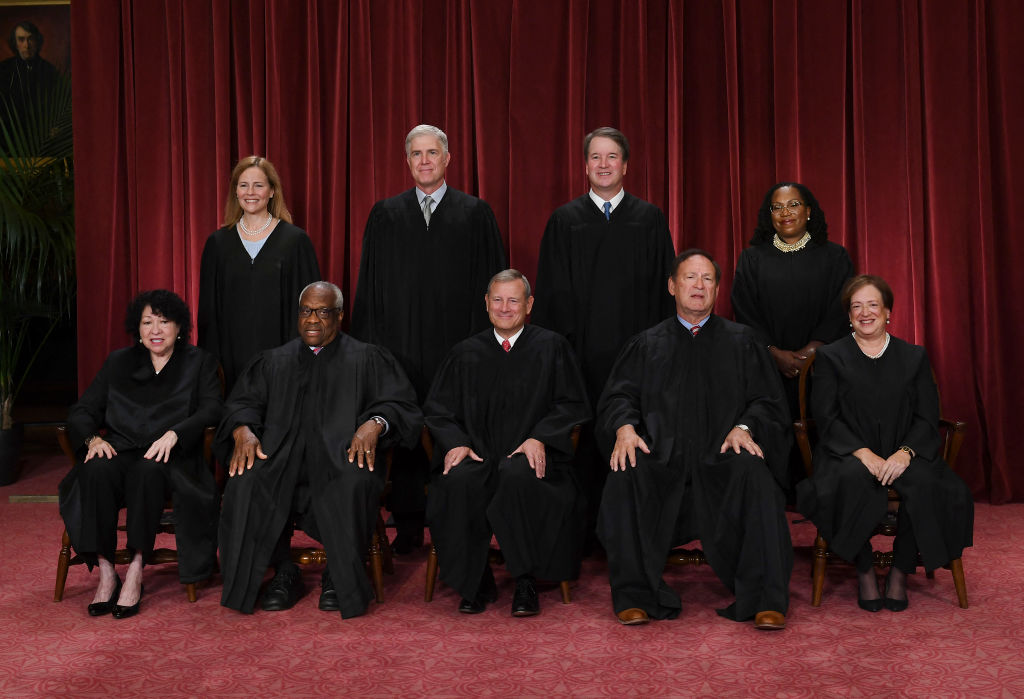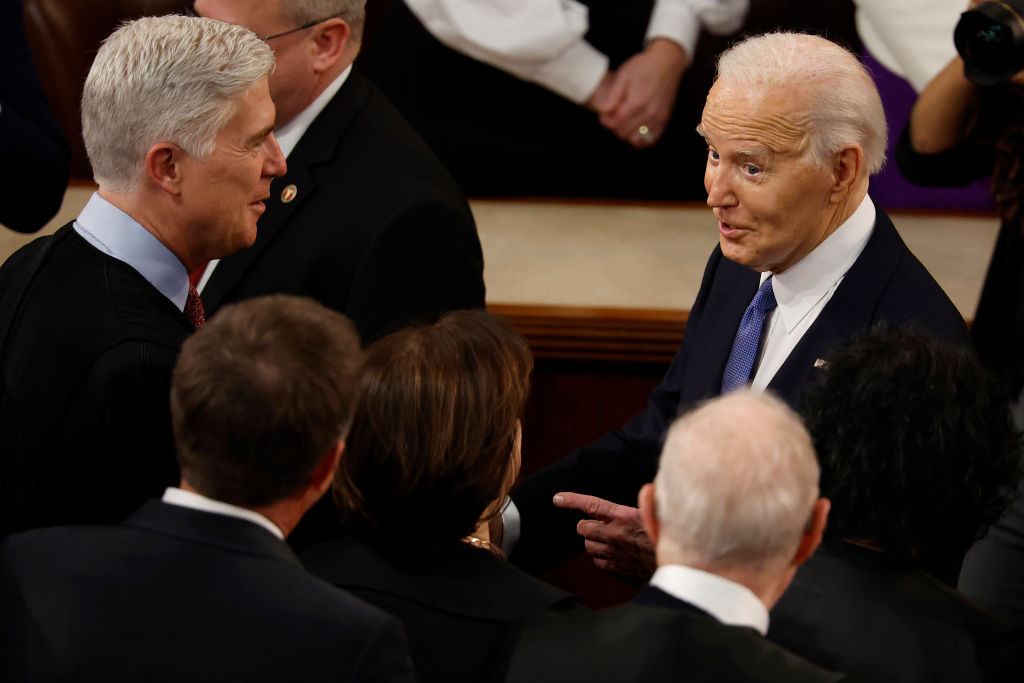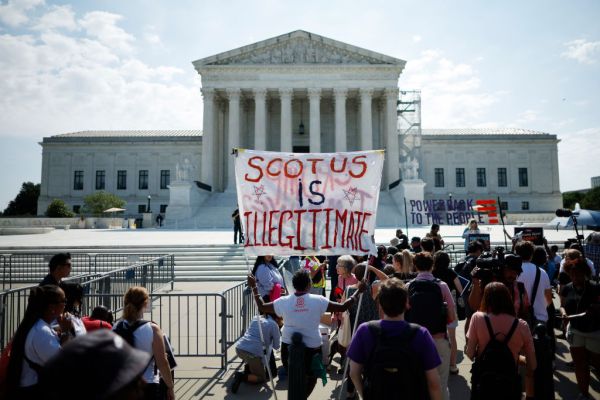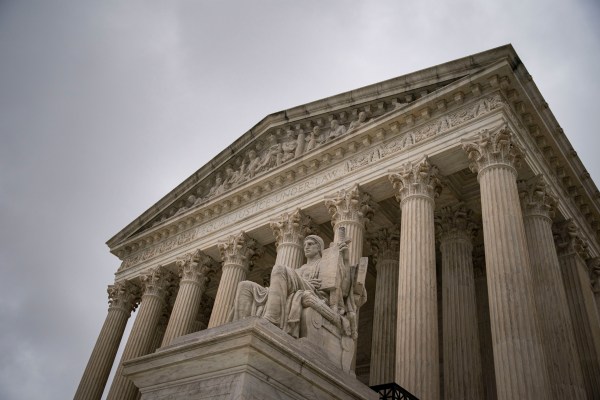On February 5, 1937, not long after his second inauguration, President Franklin Delano Roosevelt sent Congress a special message outlining a plan to reform the judicial branch. He claimed to merely be trying to “reorganize” the modern judiciary, to help elderly justices manage their workload and “maintain the effective functioning of the Federal judiciary.” But FDR’s court reforms were not really about administrative efficiency—and the veil was soon ripped away.
Chief Justice Charles Evans Hughes reported to Congress that the court was entirely on top of its caseload and needed no additional assistance. Critics denounced the president’s plan as “court-packing,” an attempt to fill the bench with compliant yes men. In response, Roosevelt delivered a fireside chat a month later with a new framing: A stubborn majority of the court had invited “catastrophe” by striking down swaths of the New Deal during his first term, and the people were now demanding that the judicial branch “pull in unison with the other two.” It was time to “infuse new blood” into the court.
Although FDR’s court-packing plan was for a long time regarded as not just a strategic misstep but a gross violation of constitutional norms, the left today has found a renewed respect for the idea. As the median justice has shifted from Sandra Day O’Connor and Anthony Kennedy to John Roberts and Brett Kavanaugh, progressive calls to “fix” or “expand” the court grew. Democratic presidential hopefuls in 2020—including then-primary candidate Kamala Harris—fell in line with these demands. And earlier this week, President Joe Biden formally endorsed court reform (though not court expansion). Harris issued a statement of her own, describing the proposal as necessary to “restore confidence” in a court that had issued “decision after decision overturning long-standing precedent.”

Biden’s Supreme Court proposal has three parts. First is a constitutional amendment to strip presidents of any immunity from criminal prosecution. Although no specific text is available, such a proposed amendment has little chance of passage in the current political environment. For those who think the issues raised in Trump v. United States were easy, drafting an amendment likely seems easy too. On the contrary, an amendment like this one could easily create more problems than it solves. Handing Congress carte blanche authority to criminalize presidential conduct is a recipe for gutting the independence of the presidency.
Second is the imposition of 18-year terms on Supreme Court justices with vacancies to be filled every two years. Although legal experts and court watchers have discussed term limits for some time, these proposals often vary considerably. The most fundamental question facing them is whether they can be accomplished by statute or whether they require a constitutional amendment. Biden’s own Presidential Commission on the Supreme Court (which I was a part of) was divided on this question.
A group of Democratic senators led by Sheldon Whitehouse introduced arguably the most prominent version of a judicial term-limits bill, closely following a similar plan to impose term limits via a statute. The bill would allow presidents to appoint a new justice every two years. Only the nine most recently appointed justices would sit for the court’s appellate jurisdiction cases, which compose nearly the entirety of the docket. The other justices would retain their offices, but they would no longer hear the most important cases. Other versions would consider justices as “deemed retired” upon serving 18 years.
Unsurprisingly, this proposal would radically change our understanding of “life tenure.” Because the Constitution specifies that judges “shall hold their Offices during good Behaviour,” a statutory term limit would try to work by redefining what it means to hold “office.” The court has held that Congress can revise a sitting judge’s duties compared to other judges holding the same constitutional office. In the 1934 case Booth v. United States, it held that “by retiring pursuant to the statute a judge does not relinquish his office” and “does not surrender his commission, but continues to act under it” when a judge assumes senior status. A justice may retire, for example, from “regular active service” on the Supreme Court but continue to perform some duties and collect a salary under the same commission of office.
As a matter of law, it is unclear that sitting judges could be forced to take such a senior status, so long as they continue to meet their constitutional obligation of good behavior. That said, according to Booth, Congress “may lighten judicial duties, though it is without power to abolish the office.” Proponents of these changes argue that if Congress forces a justice into senior status, it has merely “lightened” his duties, consistent with Booth.
But if Congress requires a justice to lighten his duties and hear fewer or different cases, has it effectively abolished the office and replaced it with a new one? If judges may be involuntarily removed from their current duties and given different and lesser ones, have they effectively been relieved of their offices? Could Congress by statute banish Clarence Thomas to Alaska and allow him to perform only the work of a district court judge without having “abolished” his office? The court has pointed out before that “the Constitution deals with substance, not shadows.” Stripping justices of their ability to hear meaningful cases would likely be seen as a breach of judicial independence by the sitting justices.
As a matter of constitutional norms, a statutory term of service under current circumstances would in fact be a serious challenge to judicial independence. The current White House is not shying away from saying that it wants to shuffle justices off the court because it is unhappy with the substance of its decisions. Perhaps there could be a neutral rationale for setting a mandatory retirement age to avoid the problem of infirm judges—but there is nothing politically neutral about current proposals. They recall how a leader of the Jeffersonian senators once told John Quincy Adams that Federalist judges needed to be impeached because, “we want your offices, for the purposes of giving them to men who will fill them better.”
But this rationale for forcing justices into retirement raises clear concerns about how effectively the court could continue to serve as a check on Congress. If Congress can by statute pull individual justices off cases because it disagrees with the substance of their rulings, then the security of life tenure for preserving the constitutional checks and balances would become more shadow than substance.

The third of Biden’s court proposals is the adoption of “binding” ethics rules for the Supreme Court. Democrats in Congress have introduced many different ethics reform bills, but the White House appears to want a bill that would require disclosure of gifts, exclusion from “public political activity,” and recusal for spousal conflicts of interest. There are sticky problems to be resolved over what constitutes prohibited “political activity” or a conflict of interest. Restrictions on gifts can always be detailed, though there are loopholes that can be exploited or used to cast aspersions on politically disfavored judges. Activities are much harder to pin down and more likely to be subjective in their perception. A process for investigating and resolving such complaints might put controversies to bed and help “restore confidence” in the courts. More likely, though, it would become fodder for generating more controversies and distrust.
But there’s a larger problem with the idea of “binding” and “enforceable” ethics reform for the court. Can Congress set a code of conduct for an independent branch of government? And even if it can, how can such a code of conduct be enforced in a manner consistent with judicial independence? Congressional authority to make laws that are necessary and proper to execute the powers of the government is broad, but it is constrained by principles of separation of powers and the authority of the coordinate branches to act freely to perform their own constitutional duties as they understand them.
Imagine that the substance of a judicial code of conduct was uncontroversial and could be designed such that it would not credibly impinge on judicial duties. That still leaves the question of enforcement. Principles of judicial independence limit the options on what can be done to a judge who violates any proposed code of conduct. Sitting judges can be prosecuted for violating the criminal law, though there are undoubtedly some limits on what offenses the legislature could criminalize. Judges can be impeached for high crimes and misdemeanors, though a code of conduct adds nothing to the existing authority of Congress in that regard.
Moreover, justices are currently expected to recuse themselves from individual cases when they have a conflict of interest, and a likely path for any “enforceable” code of conduct is to take such decisions out of the hands of individual justices. But then where would they go? In the hands of the majority of the justices? In the hands of a panel of lower-court judges? Somewhere else?
If Congress can by statute pull individual justices off cases because it disagrees with the substance of their rulings, then the security of life tenure for preserving the constitutional checks and balances would become more shadow than substance.
Disqualifying justices from cases raises unique problems given the fixed bench. Forcing a justice off a case could easily alter its outcome, and thus the incentives for trying to take such actions are large and the bar for recusal has traditionally been high. The court itself has not traditionally treated recusal decisions as within the collective purview of the institution, but rather as matters of individual discretion for each justice. It’s not obvious that a process for disqualifying justices would be consistent with judicial independence.
The big stick of enforcement is the impeachment power. There is little doubt that Congress can exercise its own impeachment authority to enforce a code of conduct on the justices. If Congress decides that vacationing with a rich private citizen or speaking at a Federalist Society conference is an impeachable offense, then it can act accordingly. Convincing a supermajority of senators to convict a Supreme Court justice is unlikely to be easy, except in the most obvious cases of abusive behavior.
But how must Congress pursue an impeachment inquiry? In particular, can it choose to create an office of civil servants embedded in the Supreme Court to investigate potential impeachable offenses and report them to the House for further action? The House itself has the “sole Power of Impeachment.” It has enjoyed letting prosecutors and special counsels do the heavy lifting in many recent impeachment cases, but it is not clear that a statutory office of Supreme Court ethics is a constitutionally necessary and proper means for implementing the impeachment power. If Congress wants to impeach a justice, it probably needs to do the dirty work itself.
The White House has, for the moment, stopped short of calling for court-packing. But the “reforms” it has endorsed puts the Roberts Court in the congressional crosshairs. It gives administrative support to progressive activists who want to use legislative tools to alter the composition of the court and change constitutional law. Such reforms are likely to be viewed as ineffective half-measures if they do not accomplish their ultimate goal of shifting the court’s balance of power. At the same time, if their constitutional logic is accepted and normalized, then there is no reason for Congress to refrain from taking additional steps to get what it wants from the court.










Please note that we at The Dispatch hold ourselves, our work, and our commenters to a higher standard than other places on the internet. We welcome comments that foster genuine debate or discussion—including comments critical of us or our work—but responses that include ad hominem attacks on fellow Dispatch members or are intended to stoke fear and anger may be moderated.
With your membership, you only have the ability to comment on The Morning Dispatch articles. Consider upgrading to join the conversation everywhere.